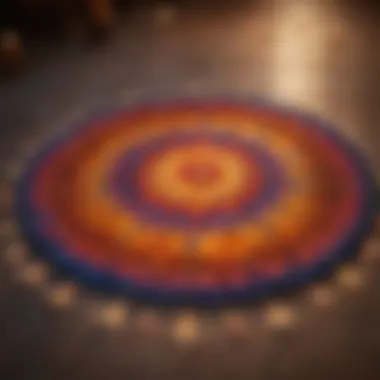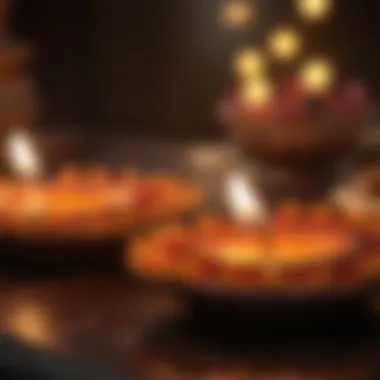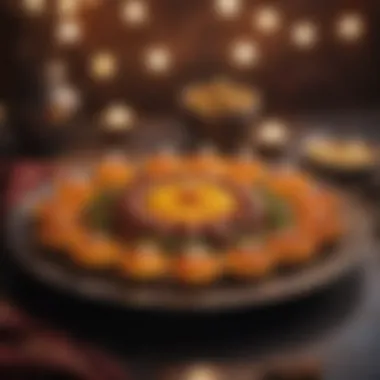Unveiling the Essence of Diwali Celebration: Origins, Traditions, and Significance


Nature Topic Overview
Diwali, also known as the Festival of Lights, holds profound significance in Hindu culture worldwide. It symbolizes the victory of light over darkness and good over evil. This article aims to delve into the essence of Diwali, unraveling its origins, traditions, and cultural importance in great detail.
Fun Facts and Trivia
- Did you know that Diwali is celebrated by millions of people across the globe, not only Hindus but also Jains, Sikhs, and Buddhists?
- One fascinating tradition during Diwali is the lighting of oil lamps called 'diyas' to drive away darkness and welcome prosperity.
- Rangoli, intricate patterns made with colored powders or flowers, adorn the entrances of homes during Diwali, symbolizing a warm welcome for guests.
- Children often burst firecrackers during Diwali as it is believed to ward off evil spirits with the noise and light.
Wildlife Explorations
Diwali's connection to nature is reflected in the festival's association with various animals and plants. For instance:
- Peacocks are often associated with Goddess Lakshmi, who is worshipped during Diwali for prosperity and wealth.
- Marigold flowers are extensively used for decorations during Diwali due to their vibrant colors and auspicious symbolism.
- Many families keep a small pot of Haldi-Kumkum (turmeric and vermilion) as part of their Diwali celebrations to honor the bond between married couples.
Environmental Awareness
Diwali promotes environmental consciousness amidst the festivities to ensure sustainability for future generations. Here are some key points:
- Opt for eco-friendly decorations like using organic materials for rangoli or reusable diyas instead of plastic ones.
- Encourage children to celebrate a 'Green Diwali' by minimizing fireworks and emphasizing on eco-friendly celebrations.
- Plant a tree as a symbolic gesture of honoring nature during Diwali and promote green practices within the community.
DIY Nature activities
Engage children in hands-on activities that foster a connection with nature during Diwali:


- Create eco-friendly Diwali crafts using recycled materials like old newspapers or cardboard.
- Plant marigold seeds with children and watch them grow, symbolizing new beginnings and growth during Diwali.
- Encourage kids to design their own rangoli patterns using natural items like petals, leaves, or colored sand.
Let the joy of Diwali be intertwined with nature's beauty and sustainability, fostering a sense of responsibility towards the environment and its diverse inhabitants.
Introduction to Diwali
Diwali, also known as the Festival of Lights, holds a paramount significance in Hindu culture, marking a period of joy and festivity. This section serves as a gateway to the essence of Diwali, providing a foundational understanding of the traditions, ceremonies, and values associated with this auspicious occasion. By delving into the historical roots and spiritual connotations of Diwali, readers can grasp the profound symbolism and importance of this celebration in Hindu beliefs and practices.
Historical Origins
The Legend of Ramayana
The Legend of Ramayana, an ancient Indian epic, plays a pivotal role in shaping the narrative of Diwali. This dramatic tale follows the heroism of Lord Rama as he embarks on a journey to rescue his beloved wife, Sita, from the clutches of the demon king, Ravana. The significance of The Legend of Ramayana lies in its portrayal of righteousness, valor, and the triumph of good over evil, themes that resonate deeply with the spirit of Diwali. The enduring popularity of this epic ensures its integral presence in Diwali celebrations, serving as a source of inspiration for devotees worldwide.
Mythological Significance
Mythological Significance in Diwali encapsulates various narratives of gods and goddesses, each symbolizing distinct virtues and principles. Through these mythological tales, individuals understand the profound spiritual teachings embedded within Diwali traditions. By exploring the mythical dimensions of this festival, devotees can glean wisdom, hope, and a deeper connection to their cultural heritage. These mythological stories enrich the tapestry of Diwali, enriching the festivities with layers of symbolism and spiritual depth.
Spiritual Significance
Victory of Light over Darkness
The Victory of Light over Darkness serves as a cornerstone of Diwali's spiritual essence. It embodies the eternal struggle between enlightenment and ignorance, illuminating the path of righteousness and wisdom. This theme underscores the transformative power of light, inspiring individuals to overcome inner shadows and embrace spiritual enlightenment. The Victory of Light over Darkness radiates positivity and resilience, instilling a profound sense of hope and optimism during the Diwali celebrations.
Symbolism of Diwali


The Symbolism of Diwali encompasses a myriad of metaphors and allegories, each reflecting deeper truths and realities. From the lighting of diyas to the exchange of sweets, every ritual in Diwali carries symbolic significance, reinforcing values of unity, prosperity, and goodwill. By decoding the Symbolism of Diwali, individuals unlock a treasure trove of cultural meanings and spiritual insights, fostering a sense of community and reverence for tradition.
Diwali Traditions and Customs
Diwali Traditions and Customs form an integral part of the celebrations associated with this auspicious festival. These customs are deeply rooted in tradition and hold significant importance for individuals and communities celebrating Diwali. From the vibrant decorations to the exchange of gifts and sweets, each tradition plays a crucial role in enhancing the festive spirit and fostering familial bonds. Embracing these customs during Diwali helps uphold cultural values and strengthen social connections, enriching the overall experience of the festival.
Rituals and Practices
Lakshmi Puja
Lakshmi Puja, a key ritual during Diwali, is dedicated to Goddess Lakshmi, the deity of wealth and prosperity. This ritual involves worshiping Goddess Lakshmi to seek her blessings for abundance and success in the upcoming year. The act of performing Lakshmi Puja is believed to invite good fortune and drive away negative energies, creating a harmonious atmosphere in homes and communities. Through chants, prayers, and offerings, devotees express their gratitude and devotion to Goddess Lakshmi, fostering a sense of spiritual connection and empowerment.
Fireworks and Decorations
Fireworks and decorations are essential components of Diwali celebrations, adding a touch of grandeur and festivity to the occasion. The burst of fireworks symbolizes the triumph of light over darkness and represents the joyous nature of Diwali. Furthermore, vibrant decorations such as colorful rangolis, diyas, and lanterns adorn homes and streets, creating a visually captivating environment. The visual spectacle created by fireworks and decorations not only illuminates the surroundings but also uplifts the spirits of individuals, fostering a sense of collective happiness and camaraderie.
Exchanging Sweets and Gifts
The tradition of exchanging sweets and gifts during Diwali symbolizes love, respect, and goodwill among friends, families, and neighbors. Sweets represent the sweetness of relationships, while gifts signify appreciation and thoughtfulness towards one another. This custom of sharing sweets and gifts strengthens social connections, fosters a sense of generosity and reciprocation, and spreads joy and happiness among individuals. Moreover, the act of giving and receiving gifts during Diwali reinforces the spirit of sharing and caring, promoting a culture of positivity and unity.
Regional Variations
Diverse Celebratory Practices
Diwali is celebrated across various regions in India, each having its unique customs and practices that reflect the diversity and richness of Indian culture. From the lighting of diyas in North India to the worship of Kali in West Bengal, the regional variations in Diwali celebrations showcase the plethora of traditions and beliefs existing within the country. These diverse celebratory practices not only add depth to the Diwali festivities but also highlight the multicultural essence of India, fostering mutual respect and appreciation for different cultural expressions. Embracing the regional variations in Diwali traditions allows individuals to learn about the heritage and customs of various communities, promoting cultural harmony and inclusivity.


Cultural Significance of Diwali
Diwali holds immense cultural significance within Hindu tradition, serving as a symbol of spirituality, togetherness, and community bonds. This vibrant festival not only marks the victory of light over darkness but also embodies the essence of joy and celebration among families and friends. The Cultural Significance of Diwali is deeply rooted in various rituals and customs that foster unity and strengthen familial ties.
Unity and Harmony
Bringing Communities Together:
The concept of Bringing Communities Together plays a pivotal role in the celebration of Diwali. This aspect emphasizes the coming together of people from diverse backgrounds, transcending barriers of religion, caste, and social status. The act of sharing traditional sweets, exchanging heartfelt greetings, and participating in communal prayers fosters a sense of unity among individuals. Bringing Communities Together promotes understanding, tolerance, and respect for cultural diversity, making Diwali a symbol of harmony and inclusivity.
Festive Atmosphere
Illumination and Joy:
Illumination and Joy are prominent features that contribute to the festive ambiance of Diwali. The lighting of lamps and decorative candles symbolizes the triumph of light over darkness and signifies the awakening of inner light within individuals. The vibrant colors, twinkling lights, and festive decorations evoke a sense of cheer and excitement among celebrants. Illumination and Joy during Diwali create an atmosphere of positivity and optimism, spreading happiness and warmth in homes and communities. This aspect adds a touch of spirituality and merriment to the festive season, making Diwali a truly magical and joyous celebration.
Modern Celebrations of Diwali
In the contemporary setting, the celebration of Diwali has transcended geographical boundaries and has embraced a more global approach, attracting participants from diverse cultures worldwide. The modern observance of Diwali encapsulates the evolving nature of this festivity, reflecting how it has adapted to the changing societal dynamics and technological advancements. It plays a pivotal role in fostering cultural exchange and understanding among people from various corners of the globe. The importance of discussing modern celebrations of Diwali in this article lies in underscoring the inclusive and evolving nature of this traditional festival, shedding light on how it has transitioned to resonate with a wider audience.
Global Observance
Diwali Festivities Worldwide
Delving into the global observance of Diwali unveils a tapestry of vibrant celebrations happening across the world in myriad forms, each adding a unique hue to the festival's essence. The significance of Diwali festivities worldwide lies in fostering cross-cultural connections and promoting harmony among communities globally. The key characteristic of Diwali celebrations worldwide is the amalgamation of traditional rituals with local customs, creating a rich tapestry of diversity and unity. This aspect serves as a beneficial choice for this article as it manifests how a traditional festival like Diwali can transcend borders and resonate with people irrespective of their cultural background. The unique feature of Diwali festivities worldwide is the exchange of cultural values and practices, enriching the global tapestry of traditions with the luminosity of Diwali. This cultural exchange brings people closer, fostering mutual respect and understanding, contributing to the overarching goal of promoting harmony and unity.
Contemporary Interpretations
Evolution of Diwali Celebrations
Exploring the evolution of Diwali celebrations unravels the adaptive nature of this age-old festival in response to the changing socio-cultural landscape. The key characteristic of the evolution of Diwali celebrations is the infusion of modern elements and perspectives into traditional practices, ensuring its relevance in contemporary times. This evolution stands as a popular choice for this article as it juxtaposes tradition with innovation, highlighting how Diwali retains its essence while embracing new interpretations. The unique feature of the evolution of Diwali celebrations is the bridge it forms between past and present, grounding the festivity in its rich heritage while propelling it towards the future. This adaptation ensures that Diwali remains a dynamic and thriving celebration, resonating with each generation and carrying forward its timeless message of light overcoming darkness. The advantages of this evolution include keeping the festival vibrant and engaging for younger audiences, ensuring its longevity and continued relevance in our ever-evolving society.







